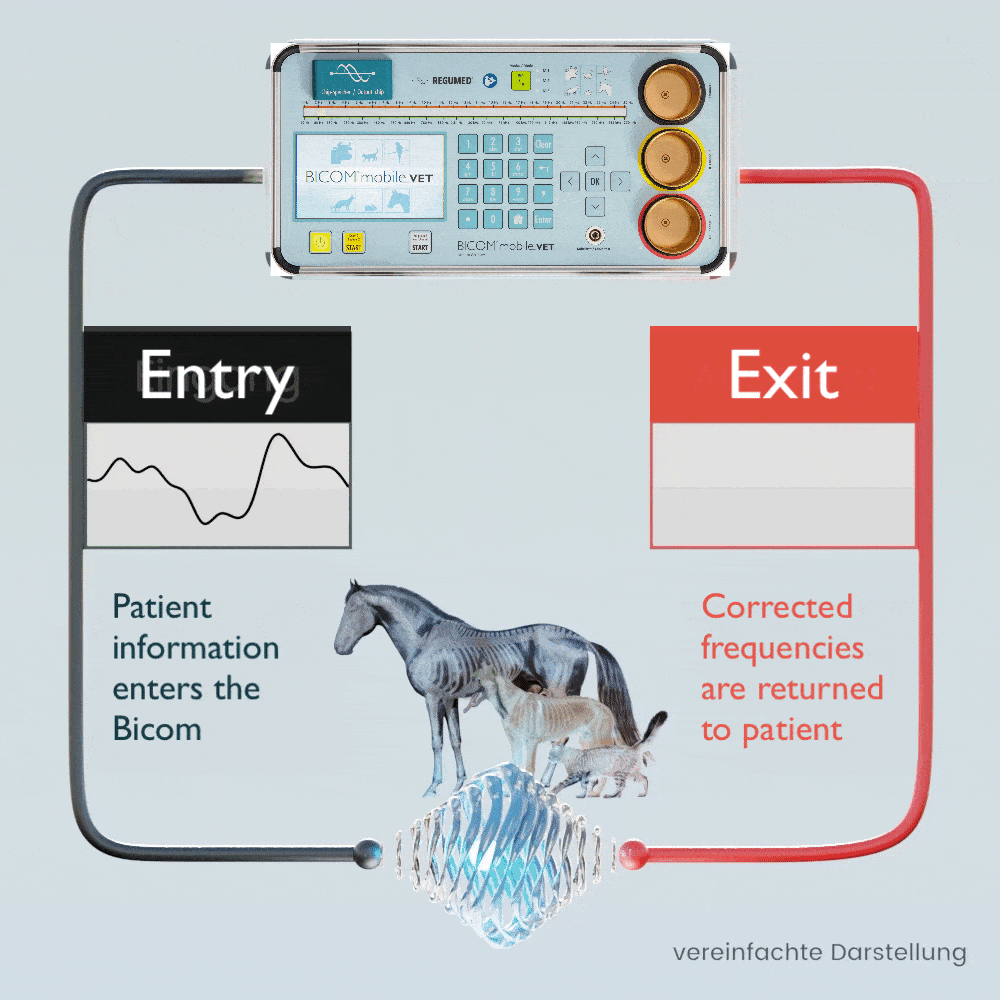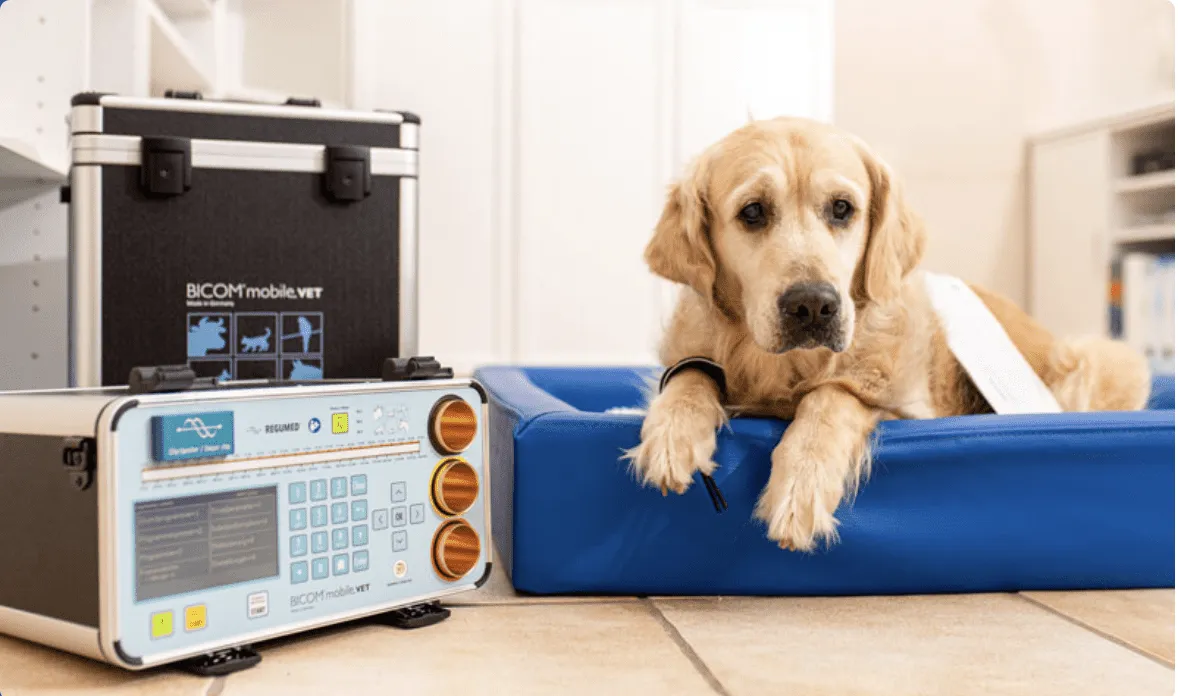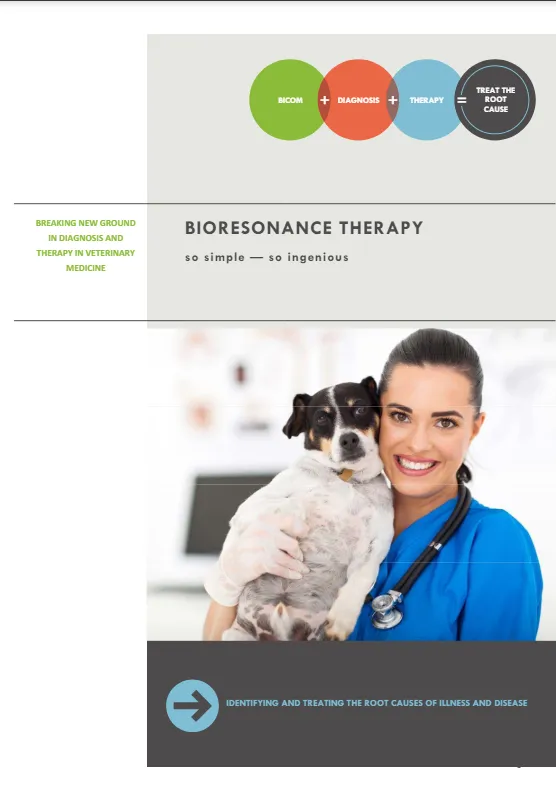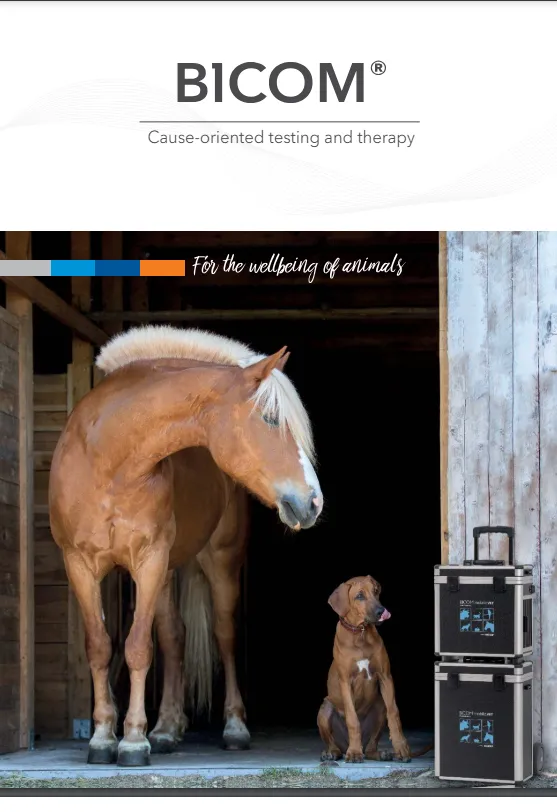Treatment with the help of the patient’s own information
in the BICOM® mobile VET bioresonance device
In contrast to other “frequency therapy devices”, BICOM® bioresonance is a method that is highly individual and perfectly tailored to the needs of the patient through the use of the patient’s own information and the possibility of testing specific wave patterns for resonance.
The patient’s own pathological and physiological information is recorded using special applicators and fed into the BICOM® mobile VET.
Depending on the therapy program, the specific wave pattern as a carrier of information is amplified, weakened or inverted and transmitted back to the patient in modulated form, which means that the transmission of information changes in clarity depending on the modulation or it disappears completely.
The treatment signals continuously adapt to the changing pathological situation of the patient. As the therapy progresses, the body’s ability to regulate is reactivated.
Find out more about this topic at our regular events. Together with veterinarians and animal naturopaths, we offer various face-to-face and online events .
The BICOM® bioresonance method is a cause-oriented, holistic treatment concept. It can narrow down the cause of the health problem in animals and find out even the hidden causes of the clinical picture.
Animals have a natural regulatory system that can also compensate for unusual influences. However, even good self-healing powers eventually reach their limits. Persistent exposure to allergens, environmental toxins, fungi, viruses, bacteria or stress and changed living conditions weaken the immune system and are often the cause of an illness. In particular, fungal infestation on the skin or chronic diseases in general are not always due to a breeding-related genetic defect, but are signs of a disturbed immune system.
The BICOM® bioresonance method is the key to successful diagnosis and therapy, especially for animals that cannot tell us exactly where it hurts or what the symptoms are. It is a gentle form of therapy that can be carried out without side effects and without additional stress for the animal.
The BICOM® mobile VET records the bioenergetic state of the animal, processes the information it contains and returns modified vibrations / therapy frequency patterns to the animal. Symptoms and stress can be diagnosed and targeted therapy can be initiated.
Through the use of endogenous and exogenous substances, the body’s own self-healing powers can be activated and imbalances that have existed for a long time can also be regulated.
REGUMED Medizintechnik are pioneers of the BICOM® bioresonance method. More than 30,000 therapists worldwide, well over 10,000 of them in Germany, successfully use their therapy concept.

Biophysical basics of the bioresonance method
Life is only possible when three conditions are met: matter, energy and information.
We also find these aspects in conventional medicine, both in diagnostics and in therapy. For example, every drug is also a carrier of information.
Information is neither energy nor matter, it is immaterial and comparable to the meaning of a message from a sending to a receiving system.
In addition to the electrical processes in the receptor proteins and biomembranes in general, electromagnetic interactions through light (biophotons) also play a role in cell communication and the transmission of information.
Specific electromagnetic wave patterns act as information carriers. These wave patterns can be modulated by the BICOM® device in order to eliminate disturbing or stressful information in an organism.
The goal is to restore the free flow of healing information (cell communication) and thus support the self-regulation of the organism and the self-healing powers.
Individual, patient-specific information or information from native substances, digitized substances or information stored on storage media can be used for therapy.
What your colleagues are saying…

Top 10 Common Dog Health Issues and When to See an Expert Vet
10 Common Health Issues in Dogs and When to See a Vet for Pets
Dogs are more than just pets—they are part of the family. As a responsible dog owner, ensuring your furry friend's health is one of your top priorities. Just like humans, dogs can face a range of health problems. Knowing when to visit a dog vet is essential to maintaining your pet’s well-being. In this blog, we will discuss 10 common health issues in dogs and when it's time to see a vet for pets. This guide will help you identify early signs of illness and take the right action.
1. Ear Infections
Ear infections are a frequent issue in dogs, particularly in breeds with long, floppy ears. Signs of an ear infection include scratching the ear, head shaking, a foul smell, or redness inside the ear. If left untreated, ear infections can lead to more severe complications, including hearing loss.
When to see a dog vet:
If your dog displays any symptoms like persistent scratching, swelling, or if you notice a discharge, it's essential to seek help from a vet for pets. Early treatment can prevent the infection from spreading further.
2. Skin Allergies
Skin allergies are another common issue for dogs. Allergens like pollen, fleas, or certain foods can trigger itchy, red, or inflamed skin. Some dogs may chew or scratch excessively, leading to sores or bald patches. Skin problems can greatly affect a dog’s quality of life.
When to see a dog vet:
If your dog’s itching persists for more than a few days or if the skin becomes irritated or swollen, it’s time to visit a dog vet. They can help identify the cause of the allergy and recommend appropriate treatment.
3. Dental Disease
Dental disease affects many dogs as they age. Plaque and tartar buildup can lead to gum disease, bad breath, and even tooth loss. In severe cases, bacteria from the mouth can enter the bloodstream, leading to problems with the heart, liver, or kidneys.
When to see a dog vet:
Regular check-ups are crucial to prevent dental issues, but if your dog shows signs of bad breath, difficulty eating, or swollen gums, a vet for pets can perform a professional cleaning or extraction if necessary.
4. Obesity
Obesity is a growing concern among dogs, just like it is in humans. Being overweight puts extra strain on a dog's joints, heart, and other organs. Obesity can lead to various health problems like diabetes, arthritis, and heart disease.
When to see a dog vet:
If your dog seems to be gaining weight rapidly or has difficulty moving, it’s crucial to visit a dog vet. They can provide a tailored diet and exercise plan to get your dog back to a healthy weight.
5. Arthritis
Arthritis is common in older dogs and larger breeds. It causes pain, stiffness, and decreased mobility. You might notice your dog struggling to get up, climb stairs, or walk long distances.
When to see a dog vet:
If you observe signs of stiffness or pain in your dog’s movements, consult a dog vet. They can recommend treatments, such as anti-inflammatory medications or supplements, to help manage the symptoms and improve your dog’s quality of life.
6. Parasites (Fleas, Ticks, Worms)
Parasites like fleas, ticks, and worms can cause various health issues in dogs, from mild discomfort to severe diseases. Fleas and ticks can lead to skin irritation, anemia, or transmit diseases like Lyme disease. Worms, such as heartworms or tapeworms, can damage a dog's internal organs.
When to see a dog vet:
If you notice fleas, ticks, or signs of worms (like scooting or a bloated belly), it's time to visit a vet for pets. A dog vet can provide effective parasite prevention and treatment options to keep your dog healthy.
7. Vomiting and Diarrhea
Vomiting and diarrhea are common in dogs and can occur for various reasons, such as dietary changes, infections, or ingestion of harmful substances. While occasional upset stomachs are normal, frequent or severe vomiting and diarrhea can lead to dehydration and serious health problems.
When to see a dog vet:
If vomiting or diarrhea persists for more than 24 hours, or if it’s accompanied by other symptoms like lethargy, weakness, or blood in the stool, see a dog vet immediately. Quick treatment can prevent further complications.
8. Urinary Tract Infections (UTIs)
UTIs are another frequent issue in dogs, particularly in female dogs. Symptoms include difficulty urinating, frequent attempts to urinate, or blood in the urine. Untreated UTIs can lead to kidney infections or other serious conditions.
When to see a dog vet:
If your dog shows any signs of a UTI, like frequent urination or accidents in the house, consult a vet for pets. A dog vet can perform tests and prescribe antibiotics to treat the infection before it worsens.
9. Hip Dysplasia
Hip dysplasia is a genetic condition that primarily affects larger dog breeds. It occurs when the hip joint doesn’t develop properly, causing pain and reduced mobility. This condition can worsen over time and may eventually lead to arthritis.
When to see a dog vet:
If your dog shows signs of discomfort when moving, has trouble standing, or exhibits a limp, it's essential to visit a dog vet. They can provide treatment options like weight management, physical therapy, or even surgery in severe cases.
10. Respiratory Problems
Dogs can suffer from respiratory issues due to infections, allergies, or underlying conditions like asthma or bronchitis. Symptoms include coughing, wheezing, or difficulty breathing. In brachycephalic breeds (dogs with flat faces like Bulldogs or Pugs), respiratory problems are especially common.
When to see a dog vet:
If your dog is coughing frequently, has labored breathing, or you notice a blue tint to their gums, it’s crucial to see a dog vet immediately. Respiratory problems can escalate quickly, so early intervention is key.
Conclusion
Being aware of these 10 common health issues in dogs can help you take proactive steps to protect your pet’s health. Regular check-ups with a dog vet are essential for catching problems early, but knowing when to see a vet for pets can make all the difference. Whether it's an ear infection, skin allergy, or something more severe like hip dysplasia, timely medical care ensures your dog stays happy and healthy.
When it comes to the health of your furry companion, it's always better to be safe than sorry. Don't hesitate to contact a professional dog vet if you notice any signs of illness or discomfort. They can provide the expert care your pet needs to live a long and happy life.
Treatment Priorities
For gentle and optimal treatment of the causes of diseases in animals
The BICOM® bioresonance method is predestined for use with large and farm animals such as horses , but also with dogs , cats and small animals. The treatment focus of the BICOM® mobile VET is wide-ranging. It is now used for many indications.
It recognises health deficits at an early stage and is used, among other things, for the following symptoms:
sweet itch
Feed intolerances
allergies and related diseases
COB/COPD
leishmaniasis
Lyme disease
anaplasmosis
lameness in horses
hoof ulcer
Poisoning by poisoned baits, plants etc.
mauke
Feline infectious peritonitis (FIP)
Cat flu/cat disease
eye/conjunctivitis
and much more
Get advice now!
Our experts are happy to be there for you personally
Our BICOM® bioresonance experts are available to answer any questions you may have
and will be happy to advise you personally and individually.




Request more information
Quick Links





Facebook
Instagram
Mail